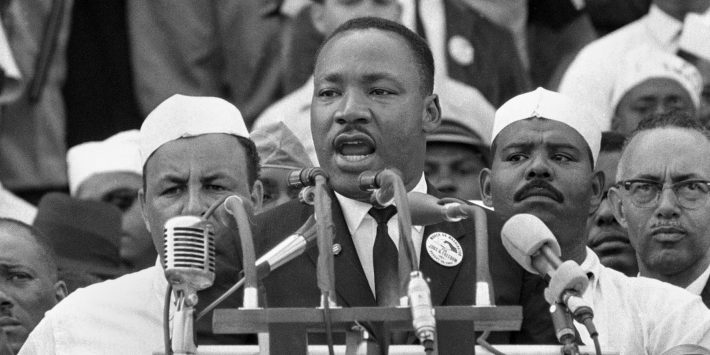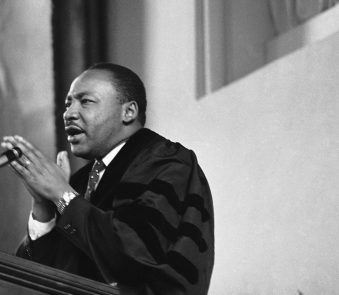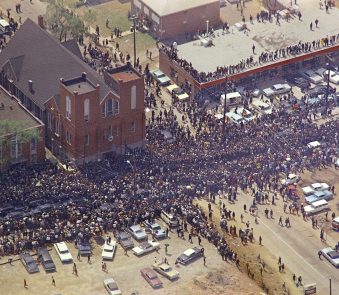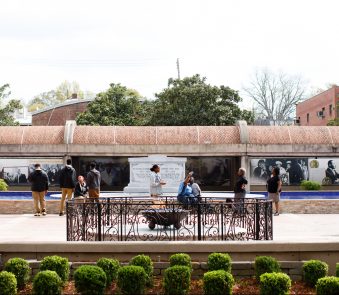Why ‘I Have a Dream’ Remains Among The 10 Most Memorable Speeches In History

 In My List
In My List
In 1963, the Rev. Martin Luther King Jr. stood on the steps of the Lincoln Memorial, addressed a crowd of an estimated 250,000 people and declared “I have a dream.”
His speech called for an end to racial discrimination in the heat of the United States’ civil rights movement, but it also carried a message of hope.
“I Have a Dream” has become one of the most memorable speeches in history, but according to the Encyclopӕdia Brtiannica and constitutioncenter.org, it didn’t go as it was originally planned.
At first, King’s aide advised him not to talk about “the dream.” But King began improvising after singer Mahalia Jackson called out from the crowd, imploring him to tell the audience about “the dream.” Now King is remembered for those courageous words.
Ed Lee, Emory University’s award-winning debate coach, said a great speechwriter, like King, understands who their audience is.
“MLK was fantastic at that. He understood that, even in the moments of the most dreadful parts of our nation’s history — that the audience needed to understand that there was a sense of hope — that there was a path away from disparity that they were existing in,” Lee said.
Lee also noted that King’s speeches have been remembered more than other activists like Malcolm X.
“I think that Malcolm X was one of our nation’s preeminent public addressers, and yet, we do not remember his speeches in the light that we remember (King’s) speeches, primarily because I think that Malcolm X’s speeches were far less hopeful,” Lee said. “Some would say they are far more realistic, but they were far less hopeful.”
In 2016, TIME Magazine published a list of the 10 greatest speeches in history. “I Have a Dream” is part of that list.
“There are really good speeches and really good speakers who deliver those speeches all the time, but they’re not delivering those speeches at the moment, in which the audience, in which the community needs for them to be heard,” Lee said.
Lee said a speech worthy of a top-10 list brings three elements together: the situation, the speaker and the audience. A good speaker addresses the needs of the audience in the right moment at the right time.
Here are the greatest speeches in history, according to TIME.
“Apology” by Socrates
When: 4th Century B.C.
Where: Athens, Greece
When the Greek philosopher Socrates was put on trial for impiety, he called his accusers “slanderers” and claimed they were trying to escape judgement for their wrongdoings. Consequently, the jury sentenced Socrates to death by poisoning, according to Encyclopӕdia Brtiannica. “Apology” is often attributed to his student, Plato, and is believed to be the defense Socrates gave in his trial.
Notable quote: “The hour of departure has arrived, and we go our ways — I to die, and you to live. Which is better God only knows.”
In this speech, Socrates was stubborn and did not appeal to his accusers. He could have been more humble, Emory’s Lee said, but if he had, his speech would have been far less memorable.
“Give me Liberty or Give me Death” by Patrick Henry
When: March 23, 1775
Where: Richmond, Virginia
After King George III had ignored the colonists’ complaints, representatives from the American colonies met at the Second Virginia Convention at St. John’s Church. Patrick Henry, a lawyer and politician, gave an impassioned speech calling for a revolution, history.com.
Notable quote: “Give me liberty or give me death!”
“Defending the status quo or saying something that everyone already agrees with is not the substance of a great speech,” Lee said.
“The Hypocrisy of American Slavery” by Frederick Douglass
When: July 4, 1852
Where: Rochester, New York
Frederick Douglass was born as a slave but escaped to the North when he was 20 years old, according to history.com. He became a prominent abolitionist and edited an influential black newspaper for 16 years. Douglass used the United States’ Independence Day to make a point about the bondage of African slaves in the South.
Lee said Douglass’s stylistic repetition and juxtaposition of celebrating freedom on the Fourth of July while others were enslaved in the South is what made this speech so memorable.
Notable quote: “The Fourth of July is yours, not mine. You must rejoice. I must mourn.”
“Gettysburg Address” by Abraham Lincoln
When: Nov. 19, 1863
Where: Gettysburg, Pennsylvania
President Abraham Lincoln wasn’t a featured orator at the official dedication ceremony for the site of the bloodiest and most divisive battles of the Civil War, but his remarks became one of the most unforgettable speeches in history, according to history.com.
Lee said Lincoln used the “power of triplets” when he said that a “government of the people, by the people and for the people, shall not perish from this earth.”
“We remember things in threes,” Lee said.
Notable quote: “The world will little note, nor long remember what we say here, but it can never forget what they did here.”
“Women’s Rights to the Suffrage” by Susan B. Anthony
When: 1873
Susan B. Anthony was arrested and fined $100 for voting illegally in the 1872 presidential election, according to history.com. She never paid that fine. Instead, she traveled the county campaigning for women’s suffrage.
Notable quote: “It was we, the people; not we, the white male citizens; nor yet we, the male citizens; but we, the whole people, who formed the Union.”
Again, repetition helped people remember this speech, Lee said.
“Blood, Toil, Tears and Sweat” by Winston Churchill
When: May 13, 1940
Where: British Parliament
This is Winston Churchill’s address to Parliament as Great Britain’s new prime minister, according to history.com. Churchill told Parliament that his new policy was “to wage war by sea, land and air.”
Notable quote “I would say to the House, as I said to those who’ve joined this government: ‘I have nothing to offer but blood, toil, tears and sweat.’”
“Inaugural Address” by John F. Kennedy
When: Jan. 20, 1961
Where: Washington, D.C.
President John F. Kennedy gave his inaugural speech urging citizens to come together and serve their country.
Notable quote: “Ask not what your country can do for you; ask what you can do for your country.”
“I Have a Dream” by Martin Luther King Jr.
When: Aug. 28, 1963
Where: Washington, D.C.
Martin Luther King Jr. gave the speech during the March on Washington for Jobs and Freedom. His message of hope distinguished him from the words of other civil rights leaders like Malcom X, Lee said.
Notable quote: “I say to you today, my friends, that in spite of the difficulties and frustrations of the moment, I still have a dream.”

“The American Promise” by Lyndon B. Johnson
When: March 15, 1965
Where: Washington, D.C.
In an address to Congress, President Lyndon B. Johnson remarked on violence that erupted after a peaceful civil rights protest in Selma, Alabama.
Notable quote: “There is no Negro problem. There is no Southern problem. There is no Northern problem. There is only an American problem.”
“Remarks at the Brandenburg Gate” by Ronald Reagan
When: June 12, 1987
Where: Outside the Brandenburg Gate in Berlin, Germany
Standing in front of Berlin’s Brandenburg Gate, President Ronald Reagan challenged soviet leader Mikahil Gorbachev to take down the Berlin Wall. The wall was taken down two years later.
Notable quote: “Mr. Gorbachev, tear down this wall!”



